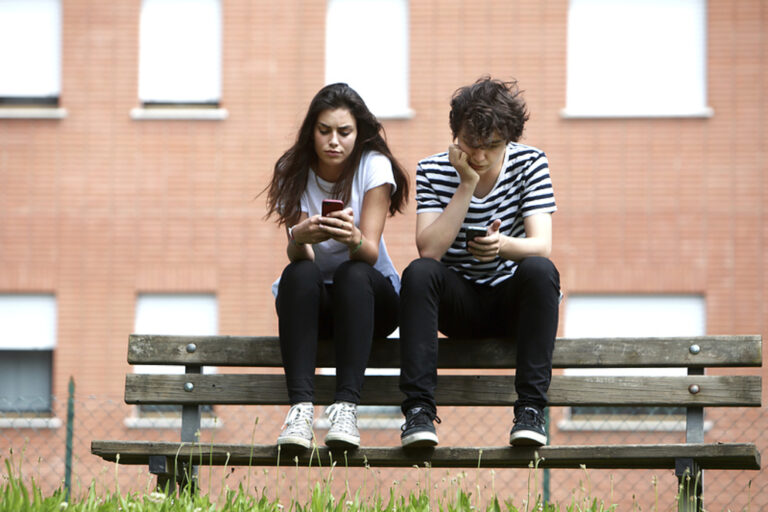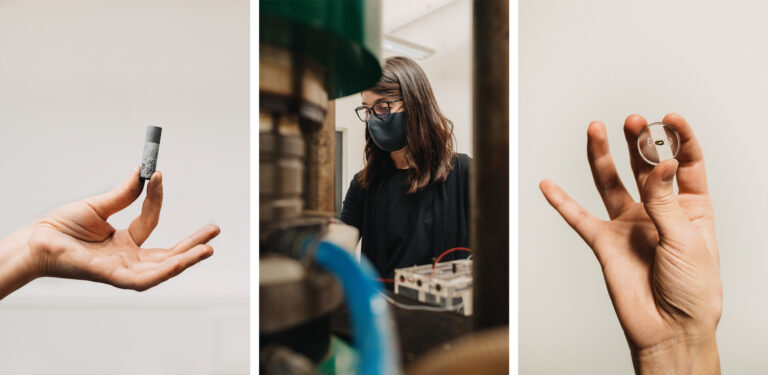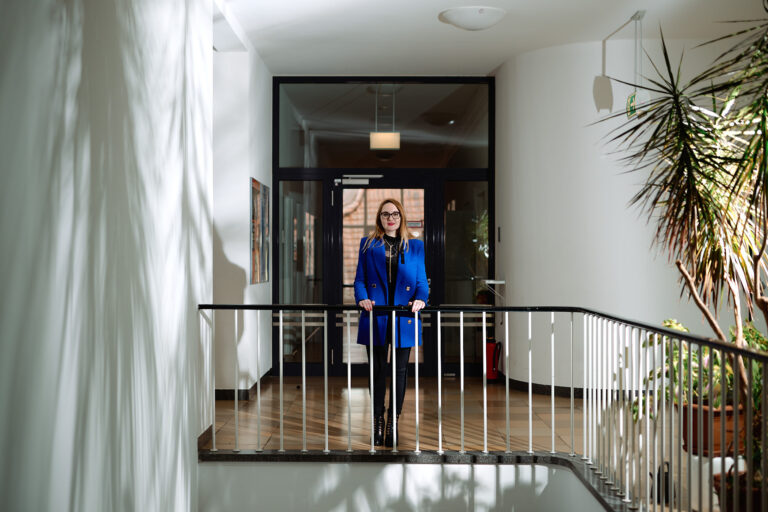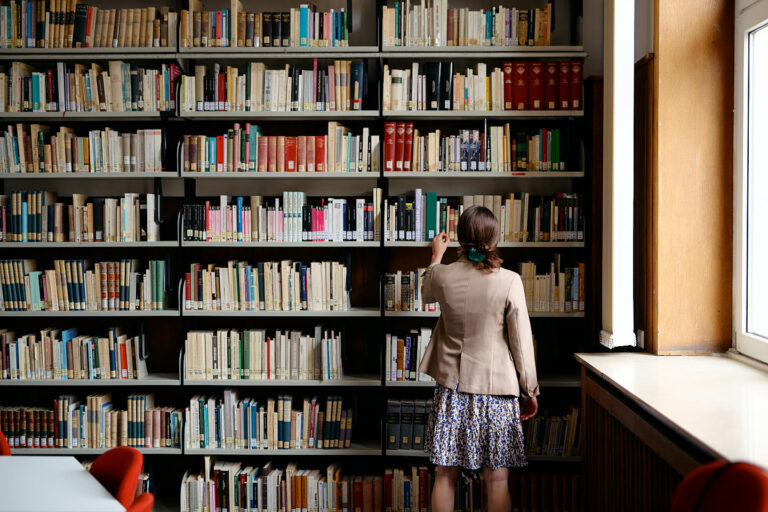
What Is Self-Publishing to a Scientist? How Dr. Louisa Preston Uses Zines to Advance Her Research – And Other Questions!
In the series “33 questions” we introduce, in no particular order, our WiRe Fellows who are currently working on a research project here at the University of Münster. Why 33? Well, if we think of the rush hour of life, it is kind of the age that lies in its middle. And we also like the number😉.
In today’s episode we are speaking with Louisa, artist-publisher/researcher and passionate lover of publishing and self-publishing within and across visual arts and literature. Louisa’s WiRe research project at the Chair of Prof. Dr. Corinna Norrick-Rühl focusses on artist-publisher activities.
1. What motivated you to work in the field of publishing studies?
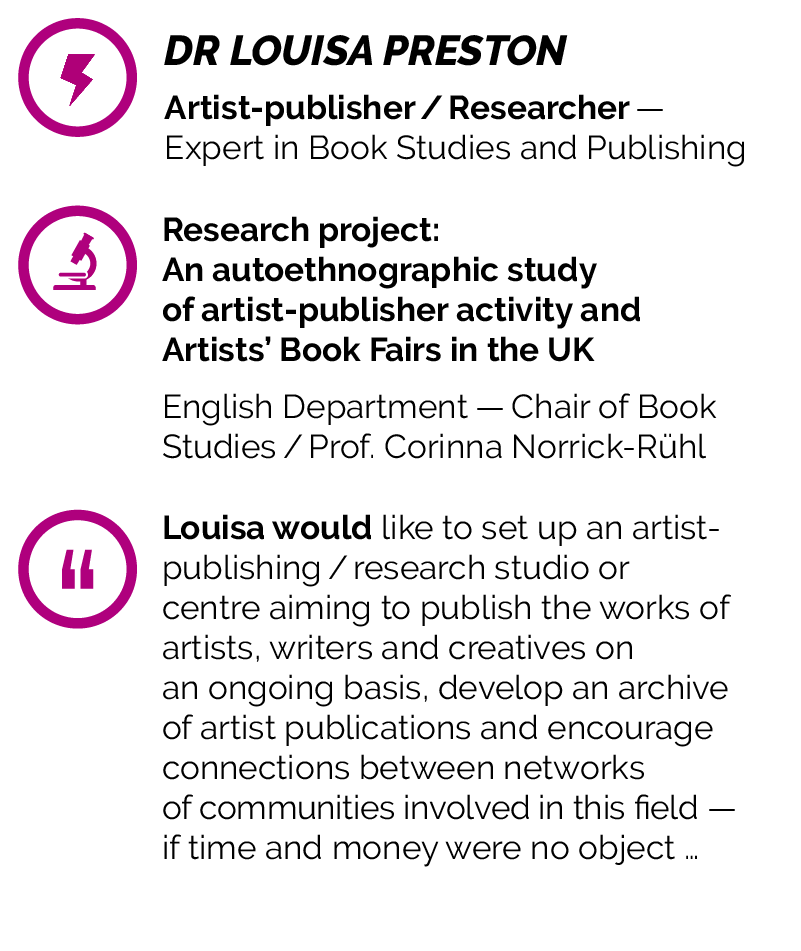
I trained in Fine Art at Duncan of Jordanstone College of Art and Design, University of Dundee (DJCAD) after starting out doing a joint Product Design Engineering course straight after school at the University of Glasgow & Glasgow School of Art. The joining of the creative processes in design with science and technology appealed to me. However, I realized after persevering for two years that training to enter the engineering profession was not for me. I opted to develop my drawing skills and explore ideas in visual ways through photography, sculpture and mixed media installation under the expertise and guidance of tutors at DJCAD.
After graduating, I worked as an artist based in Dundee for several years. During which time, I became increasingly interested in the capacity for publishing and publication to explore, present and encourage ideas and debates within contemporary arts. I had some experience of artist book making and became more deeply interested in the variety of gallery publishing as well as the publications produced by the major art publishers Phaidon and Taschen. I decided to apply to do a Masters in Publishing Studies at University of Stirling, which marked the start of my journey as a scholar in publishing studies. The publishing project I developed, as part of that course, provided me with the skills, knowledge and practical experience of devising and developing a viable publication product fit for market, alongside a marketing plan and launch materials etc. This mixture of the visual creative work, editing and content creation, the potential and capacity for publication in various forms – digital and print – to instigate, develop and encourage further debates in contemporary arts, literature but also more widely in society, continues to motivate me today in my work in publishing studies.
2. Describe your daily work in three words.
Motherhood, Visual/critical thinking, Reading & Writing (Not three words but three key phrases – are they allowed?!).
3. Describe your research topic in three words.
Autoethnography, Artist-publishing, Book Fairs.
4. A good artist-publisher/researcher needs…
A good artist-publisher/researcher in the post-digital age needs I think first and foremost a strong network of researcher colleagues and support in the form of university libraries, archives, as well as fantastic opportunities like this one at Münster! Other essential tools I would be useless without include: a desk with a computer and internet connection, scanner, printer, camera (digital and SLR) and a drawing desk with paper, sketchbooks, pens, paint, paintbrushes, my mobile phone, Instagram, Twitter and a finger on the pulse of publishing in the UK, especially self-publishing, and publishing in the visual arts.
5. What is the best experience you have had as a scientist / researcher?
There are so many good experiences, but if I was to choose the best it would honestly be this one that I am embarking on now. That’s because this research I am working on feels like an important first step I am making towards combining my interests and passion in the visual arts, artist-publishing, and my own creative practice/research post-PhD. It’s such an exciting step in the development of my research trajectory within publishing studies and book culture. It’s also developing my research networks and I am thrilled to be working with University of Münster and Corinna Norrick-Rühl, the Chair of Book Studies. The contact hours and workshops with the WiRe fellows I have met so far have been really enlightening and I can’t wait to develop those friendships and connections that we share further as we progress through the next nine months. I just hope I can live up to the expectations I have set for myself!
6. What was your biggest research disaster?
I think I have been incredibly lucky in that (touch wood!) I haven’t had a huge research disaster. At the time, there were moments where I felt certain that my dissertation for the MLitt in Publishing Studies at the University of Stirling was a disaster! I spent a huge amount of time and energy in conducting my research into artist publishing and artists’ books for my dissertation, looking into relationships with technology and new ways of producing publications that artists and galleries were employing. I was so engaged in gathering the research material, I had neglected to keep on top of writing up the dissertation as I went. Though I had some parts of the dissertation written, I had to work round the clock for the last few days before the deadline to get the final submission ready with all the images included, correct referencing and formatting etc. It was certainly the biggest challenge I had contended with until that point, but in the end, it wasn’t a disaster at all. It was awarded The Stirling Centre for International Publishing and Communication Prize for the most outstanding Dissertation or Research Case Study 2011–12. So, I guess in answer to that, no matter how much of a disaster it feels like at the time, it can be turned around for successful results.
7. Which (historical) important scientist would you like to have dinner with? What would you ask?
This is a tough one! I think it would have to be Stephen Hawking and I would ask him what is the deal with black holes? Does this count? It’s not in my field but you never know what can be applied to your own thinking from other disciplines.
8. If time and money were no object: Which research project would you like to do?
I would like to set up an artist-publishing/research studio or centre aiming to publish the works of artists, writers and creatives on an ongoing basis, develop an archive of artist publications and encourage connections between networks of communities involved in this field. Various research strands would be developed on an ongoing basis accordingly and would set out to encourage university and practice relationships which aim to soften the boundaries between the academy and industry/practice.
9. What is your favourite research discipline other than your own?
Astronomy and astrophysics, anything to do with the study of space and the universe, black holes, galaxies, and other planets is just mind bogglingly fascinating to me. I am most fascinated by the immense scales involved in space and time, and the idea of knowledge that is developed in a purely theoretical manner which to me involves such brilliant scientific minds and imagination.
10. What do you consider the greatest achievement in the history of science / your field?
It’s got to be Johannes Gutenberg’s invention of the movable-type printing press, which in the 1400s commenced an enormous impact that printing would have on the development of society and language in Europe and the western world.
11. How did you survive your PhD time?
I’m not sure! It was really tough towards the end. I had such fantastic support though from my supervisors, especially Professor Claire Squires, and my family of course. I received some extra funding support from the University of St Andrews also to help with childcare costs so I could spend some consolidated time on writing up my final thesis. I also did some writing retreats, organised by Rowena Murray, which helped immensely with getting the bulk of the writing underway for the thesis. The tools and strategies I learned on these writing retreats I still use today. The lessons I learned during my PhD are so invaluable too around organizing my time, workloads for deadlines and the importance of keeping a daily writing habit, which I still maintain today.
12. What direct or indirect relevance does your research have for society?
Art and culture reflect our lives and society, our daily experiences, issues, politics and celebratory themes back to us. This commentary and reflection of who we are, and the creative ideas associated with that in all kinds of artforms, i.e., literature, fine arts, graphic design, games, theatre, and music is intrinsic to society as it is formed and re-formed in a production and consumption loop. In this post-digital age, where digital and analogue tools are used interchangeably alongside virtual and in-person experiences, mobile devices and physical spaces, networks of cultural production and consumption are continuing to evolve in ways which challenge the status quo for cultural organisations and their audiences. My research bears relevance to publishing which is a part of this wider creative sector of society and aims to contribute to our understanding of the ways in which publishing is both a means towards cultural production and consumption through various artforms in complex networks, as well as through the medium of the book as a commodity.

13. How did you imagine the life of a scientist / researcher when you were a high school student?
I’m not sure that I did imagine the life of a researcher when I was at school. I think I was too concerned with passing my exams! It always felt like something remote from me until I went to art school and started to understand the ways in which making artworks and studio practice could be a mode of research. I think that I thought being a researcher involved being based in a library or at a desk the whole time, that it involved lots of writing, reading and studious work, which in the most part it does, but it can also involve lots of other exciting activities and alternative ways of living and carving a career which I have found to be most rewarding.
14. Is it actually different? In what way?
So, to this question, yes and no. I think the life of a researcher is different from what I described above in terms I what I imagined it to be and how it is, because I think it’s always developing. Certain aspects remain the same, reading, writing, drawing, and other tools for the job, but I feel like research is an evolving thing which depends a lot on the opportunities that come along that need to be grasped and won, and the people that you meet, the colleagues and supporters of your research that you develop. It’s certainly not a remote activity (though I am conducting this research remotely!) I mean I don’t feel ever that I am doing my research in isolation. There are always exciting discussions to be had in and outside of my field and I enjoy drawing on those and contributing to them immensely.
15. What do you like most about the “lifestyle” of a scientist? And what least of it?
Though I have said that I never feel like I’m doing my research in isolation, sometimes it can be a lonely experience in the day-to-day activities, especially in this last year with Covid-19 lockdowns in the UK. Though I enjoy working on my own and am certainly more capable than most members of my family in that respect of working for long periods on my own, it can be hard when you don’t have an office to go to or a team of people that you are working with on a daily basis to do a job. That would be the aspect that I least like about the “lifestyle”. On the other hand, I wouldn’t give up the freedom of developing my research and the intellectual and creative acrobatics that that involves, which I am experiencing just now. The possibilities to carve out the shape of the career that I am striving for, incorporating interests in a combination that don’t necessarily fit neatly into a labelled pre-defined ‘job-spec’ is also the best aspect of this “lifestyle”.
16. Do you think your career would have evolved differently if you were a man?
I’m not sure I can answer this question! I think there’s two aspects here for me that have influenced the way my career has evolved. The first is the challenges of motherhood and the consequent pace of my career progression and the second is being a woman in what felt like a male dominated profession.
For the first, I love my son dearly, but having him – pregnancy, birth, and maternity leave – delayed the progression of my career in terms of time out to nurture our new baby until he was old enough to go to nursery care. I love what I do in my research but its difficult juggling motherhood with career life, I think more so in academia. I think I can say that the relevance for me of feminists and feminism didn’t fully hit me until becoming a mother! I think that by being a man I certainly wouldn’t have had the same worries about the biological aspects of having children as a direct impact to my career. For me, in the early years, transitioning into motherhood was a struggle. I am lucky to be a part of a wonderful group of friends who are mums of children of the same age as Caelan, which is such a constant support.
For the second, I was lucky that my parents didn’t push me in any particular direction really after school. I went into engineering, not fully realising how male dominated it was. I think I was one of five women students in my whole class of thirty in the first year of my university course in Product Design Engineering, which when combined with the larger cohorts of Civil and Mechanical Engineering was even smaller, sitting in a lecture hall of one-hundred students approx. I found this to be very intimidating. I remember feeling so overwhelmed in what felt very much like a man’s world in some module experiences such as welding and lathe turning metal workshops at the Glasgow Naval College. This I think had a lot to do with me not really enjoying the course. Who knows what might have happened if I had felt better supported in this course as a young woman in a largely male subject/profession. Though saying that I don’t regret any of my decisions as they have led me here!
17. How would you explain your research area and topic to a child ?
The people who make the books that you read include authors, illustrators and their publishers, to name a few! A publisher buys the permissions to print out lots of copies of the story, written by the author, and gathers all the other things required to make the book, such as the images and the cover design then lays these out nicely on the page. The publisher then asks a printer to print out many copies of the book and sells the books to booksellers. Distributers get the books to the booksellers, across the UK and the world. Book fairs are places where publishers meet to exchange permissions, also called rights. An agent is someone who also attends book fairs to sell rights on behalf of an author to a publisher.
My research looks at a small area of these book fairs, called artists’ book fairs. Artists’ books are different in some ways to the books that you read because they are often not made in such large numbers and don’t involve a big commercial publisher like those who attend the main book fairs. They are often made by smaller publishers and printers, and they often circulate in different markets, meaning they are often not found in your local Waterstones bookshop or Tesco superstore in the shelves there amongst the bestselling hard back or paperback books. Artist publications come in a variety of formats, and they also aim to do different things, some accompany an exhibition in a gallery, whereas some explore the very form of the book and aim to create something entirely different – an artwork in its’ own right.
The different reasons for making artists’ books and aims for publishing in different forms within the visual arts, which target alternative markets and audiences is fascinating to me. My research aims to understand more about these differences, the way books are made, how they are shared within creative communities, audiences and readerships and how they are used by people and parts of society they live in. Artist’ book fairs are places where all of these things can be observed in one way or another which makes them ideal places to focus on for this research.
18. What is the biggest challenge for you when it comes to balancing family and career?
Childcare has always been a bit of a challenge for us. In the UK the costs are high until the child is 3 years old and there is some funding available for some childcare on a part time basis. I have often found myself in a bit of a battle over how and when to prioritise my career over our family life and vice-versa. Organizing family and work activities that balance over the week is tricky and finding dedicated time to concentrate on my work for a consolidated time been a challenge at times.
19. How do you master this / these challenge(s)?
I have learned to become hyper-organised and try to plan ahead and make back up plans for when best-laid plans don’t work out, which can often happen! I try to dedicate my focus to family time when we have planned for that, so that I can appreciate every moment with family, and vice-versa for work times.
20. How often do you as a friend / partner / mother / daughter feel guilty when you have to meet a deadline – again?
I used to feel this more often in the past as a friend and a partner, but since we had our son I tend, or at least try, to be really strict with myself and my time management so that when a deadline is approaching I feel that I am on top of it. Things come up though and at times when I am working late to meet a deadline, I do feel guilty about asking my partner to take on my share of the parenting to allow me to get my work done.
21. How did you imagine your future as a child? What profession did you want to pursue?
I honestly can’t remember imagining my future as a child. I never really knew what I wanted to be or what profession to pursue. I flirted with the idea of going to medical school to become a doctor (very different to the one that I am now!) mainly because some of my friends were planning to do that. But after some work experience at a pharmacist thought better of that. Instead, I followed my interests and hoped that they would bring me to a place or profession that would suit me. I guess by doing that, that’s what generated my current place in this research profession, which is something that I could never have prescribed or foreseen.
22. How do you keep your head clear when you are stressed?
Exercise is so important for me to stay level-headed and calm. I go running at least twice a week and train at a local gym which has introduced me to weightlifting. Traditionally and culturally, at least in my experience, this is such a male dominated activity but the gym I am at now has no such feeling or culture associated with it. The strongest and fittest people I know are women! I am training for the Spartan Beast – a 21km obstacle course which will take place on the 26 September. My fitness training reminds me that anything is possible if you plan, prepare for it and put the hard work in, which helps sometimes when you are in the thick of a research project!
23. What is your favourite German word?
Danke – mainly because I don’t know very many German words, yet, though I have registered for a beginner’s course at Münster. This seems like the most useful one to know and it’s important to be able to express thanks in whichever country you are in.
24. What makes you most happy about the world?
People’s and the natural world’s ability to adapt and evolve, sometimes in the harshest of conditions. It’s perhaps not something that makes me most happy about the world, but offers some comfort when finding glimmers of happiness in certain moments when seeing how cruel life can be across the globe.
25. What or who inspired you to become an artist-publisher/researcher?
A few people were key in my development towards the place that I am in now. The first were my tutors at art school. Tracy Mackenna and Edwin Janssen have both been very influential to me and they inspired me to make being an artist a way of living in the world and working which is alternative to the mindset of ‘getting a job’. What I mean by that is using my art practice as a means towards generating meaning and understanding, which is I suppose what I aim to do with my work as an artist-publisher/researcher. In getting to this point however, I have also been inspired by the research and guidance of my PhD supervisor Professor Claire Squires, who in combination with my PhD experience has inspired me to think openly and creatively about my position as a researcher/practitioner within the field of publishing studies.

26. Which of your traits bothers you the most in your daily work?
One of my traits, I am told is that I am a perfectionist. That’s difficult to square sometimes with the practicalities of busy day to day life as a mother and working part-time as a lecturer and part-time in this fellowship. I’m learning to ease off a bit and accept when things are the best that they can be within the limitations, but it’s hard for me to do sometimes.
27. And which of your traits help(s) you the most in your daily work?
I’m a bit like a dog with a bone, if that’s a saying that translates well into German?! Meaning I am very determined when I set my mind to something, which is a trait I would say that is absolutely necessary when it comes to conducting research, no matter which discipline you are in.
28. What worries you most about the world?
Inequality, violence, climate change, would be the top three! These in combination are enormous challenges and I worry a lot about how we are going to address them collectively while we seem busy at the moment in our individual countries battling the challenges of Covid-19 amongst other domestic issues. I worry that if we don’t start collectively addressing our climate change we will not have much of a future home to live in, and the rest of our worries will fast become a moot point.
29. If someone asks you about your age, what do you respond spontaneously?
I tell them my age. I’m not telling you though! I have a rather flippant attitude to my age though as I don’t really see it as a limiting factor to my life or really a factor that has any consequence to me really – well not now, it did when I was younger and couldn’t wait to be 18 to be able to go to the pub!
30. Which hobby have you given up for a life in academia?
If there was one hobby that has had to fall by the wayside it would be Photography. It does make its way into my work in terms of observational materials and a mode of collecting data, but I haven’t made images purely for their own merit and edited them in that fashion for a long time.
31. If you could travel in time: in which epoch and at which discovery or event would you have liked to have been there?
I would have like to have been with the astronauts for the moon landing. That is the one event that I don’t think can be surpassed in terms of an experience to have. I would like to travel into the future as I would love to see if we manage to travel to other planets in the future or if we successfully manage climate change.
32. What are the advantages and disadvantages of doing a Research@home-WiRe-fellowship?
The main advantage of doing this Research@home-WiRe-fellowship is not having to worry about spending a large chunk of time away from my son or uprooting our family to move to Münster if I was to do this fellowship in a traditional way. It is definitely an advantage of doing this fellowship remotely that I can work from home, but that has drawbacks sometimes in that family and work life can become too blended. Having a clear boundary in terms of going out from the house to a place of work can help with focussing more deeply on that work, which I feel I could do with sometimes. Though we have some plans in place for me to visit Münster in March next year, I think a minor disadvantage of doing a remote fellowship is that lack of in-person contact with fellow scholars and that first-hand experience of the University and Münster as a place to live and work in. Having said this, the virtual meetings have been really good at fostering a collegiate sense so far!
33. What is your favourite place to relax from research during the pandemic?
The woods, mountains anywhere away from the bustle of the road, streets etc. Luckily for me, Scotland is full of places like this. Locally I go to Kinnoull Hill woods, which are located about ten minutes by car from me. I am part of the Perth Outdoor Playgroup, which I organise alongside other parents. We organise free play sessions and led group sessions like shelter building, animal tracking, plant and insect identification, and campfire making. I think the adults enjoy this time as much, if not more than the children!


